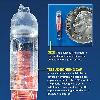RFID in Human Body
Fom IEEE SPECTRUM March 2007 Issue Wanted Power systems engineer with experience in high power 5 00 kW motor �controller design Must be U S citizen and have valid ISO1443 compatible access control RFID implant Sound farfetched Today yes A decade from now maybe not With the proliferation of radio frequency identification technology and the recent but increasing use of implantable RFID chips in humans we may already be on a path that would make such an ad commonplace in a 2017 issue of IEEE Spectrum The benefits would be undeniable n implantable RFID chip which is durable and about the size of a grain of rice can hold or link to information about the identity physiological characteristics health nationality and security clearances of the person it s embedded in The proximity of your hand could start your car or unlock your front door or let an emergency room physician know you are a diabetic even if you are unconscious Once implanted the chip and the information it contains are always with you ou d never lose your keys again But there is a darker side namely the erosion of our privacy and our right to bodily integrity After all do you really want to be required to have a foreign object implanted in your arm just to get or keep a job And once you have it do you really want your employer to know whenever you leave the office And do you want every RFID reader quipped supermarket checkout counter to note your presence and your purchases Until a couple of years ago chipping humans was largely the domain of cybernetics provocateurs like Kevin Warwick or hobbyists like Amal Graafstra see Graafstra s accompanying article Hands On Then in 2004 the U S Food and Drug Administration which regulates medical devices in the United States approved an RFID tag for implantation in humans as a means of accessing a person s health records This tag called VeriChip is a short range transponder that relies on the signal from a reader unit for its power supply see photo Anatomy of an RFID




